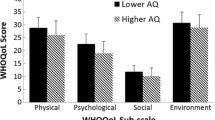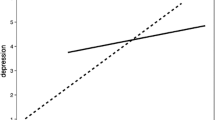Abstract
Mothers of 60 children with autism participated in this study to measure the effects of social support and hardiness on the women's responses to the stressful demands of raising a child with a disability. MANOVA analysis indicated a significant main effect for hardiness, Wilks' lambda=.859, approx. F(2, 55)=4.494, p<.02. There were no main effects for social support, or for the interaction of social support and hardiness. In regression analyses, the best combination of predictors of depressive symptoms were the Commitment dimension on the Hardiness Questionnaire and the total score on the Interpersonal Support Evaluation List social support inventory, mult. R=.783, p<.001. The best predictor of somatic complaints was total Hardiness score, mult. R=.698, p<.01. There was a significant correlation between hardiness and perceived social support, r(57)=−.67, p<.001. Results are discussed in terms of the relationship between perceived social support and hardiness and the potential buffering effect of these dimensions.
Similar content being viewed by others
References
Bandura, A. (1986).Social foundations of thought and action: A social cognitive theory. Englewood Cliffs, NJ: Prentice-Hall.
Barrera, M., Jr., Sandler, I. N., & Ramsay, T. B. (1981). Preliminary development of a scale of social support: Studies on college students.American Journal of Community Psychology, 9, 435–447.
Beck, A. (1978).Beck Depression Inventory. Philadelphia: Center for Cognitive Therapy.
Belsky, J. (1984). The determinants of parenting:: A process model.Child Development, 55, 83–96.
Breslau, N., & Davis, G. C. (1986). Chronic stress and major depression.Archives of General Psychiatry, 43, 309–314.
Bristol, M. M. (1984). Family resources and successful adaptation to autistic children. In E. Schopler & G. B. Mesibov (Eds.),The effects of autism on the family (pp. 289–310). New York: Plenum Press.
Bristol, M. M., & Schopler, E. (1983). Stress and coping in families of autistic adolescents. In E. Schopler & G. B. Mesibov (Eds.),Autism in adolescents and adults (pp. 251–278). New York: Plenum Press.
Cohen, F., & Hoberman, H. (1983). Positive events and social supports as buffers of life change stress.Journal of Applied Social Psychology, 13, 99–125.
Cohen, F., & Lazarus, R. (1979). Coping with the stress of illness. In G. C. Stone, F. Cohen, & N. Adler (Eds.),Health psychology: A handbook (pp. 140–168). San Francisco: Jossey-Bass.
Cohen, S., & Wills, T. A. (1985). Stress, social support, and the buffering hypothesis.Psychological Bulletin, 98, 310–357.
Cummings, S. T., Bayley, H. C., & Rie, H. E. (1966). Effects of the child's deficiency on the mother: A study of mothers of mentally retarded, chronically ill, and neurotic children.American Journal of Orthopsychiatry, 36, 595–608.
DeMyer, M. K. (1979).Parents and children in autism. New York: Wiley.
Farran, D. C., Metzger, J., & Sparling, J. (1986). Immediate and continuing adaptations in parents of handicapped children: A model and an illustration. In J. J. Gallagher & P. M. Vietze (Eds.),Families of handicapped persons (pp. 143–156). Baltimore, MD: Brookes.
Ferrari, M. (1982).Chronically ill children and their siblings: Some psychosocial implications. Unpublished doctoral dissertation, Rutgers University, Piscataway, NJ.
Friedrich, W. N., Wilturner, L. T., & Cohen, D. S. (1985). Coping resources and parenting retarded children.American Journal of Mental Deficiency, 90, 130–139.
Gallagher, J. J., Beckman, P., & Cross, A. H. (1983). Families of handicapped children: Sources of stress and its amelioration.Exceptional Children, 50, 10–19.
Gallagher, J. J., Cross, A., & Scharfman, W. (1981). Parental adaptation to a young handicapped child: The father's role.Journal of the Division for Early Childhood, 1, 3–14.
Ganellen, R. J., & Blaney, P. H. (1984). Hardiness and social support as moderators of life stress.Journal of Personality and Social Psychology, 47, 156–163.
Gath, A. (1977). The impact of an abnormal child upon the parents.British Journal of Psychiatry, 130, 405–410.
Harris, S. L. (1983).Families of developmentally disabled children: A guide to behavioral intervention. New York: Pergamon.
Hill, R. (1949).Families under stress. New York: Harper & Row.
Hill, R. (1958). Generic features of families under stress.Social Case Work, 49, 139–150.
Holroyd, J. (1974). The questionnaire on resources and stress: An instrument to measure family response to a handicapped member.Journal of Community Psychology, 2, 92–94.
Holroyd, J., & McArthur, D. (1976). Mental retardation and stress on the parents: A contrast between Down's syndrome and childhood autism.American Journal of Mental Deficiency, 80, 431–436.
Kobasa, S. C. (1979). Stressful life events, personality, and health: An inquiry into hardiness.Journal of Personality and Social Psychology, 37, 1–11.
Maddi, S. R., Kobasa, S. C., & Hoover, M. (1979). An Alienation Test.Journal of Humanistic Psychology, 19, 73–76.
McCubbin, H., & Patterson, J. (1983). Family stress adaptation: A double ABCX model of family behavior. In H. McCubbin, M. Sussman, & J. Patterson (Eds.),Social stresses and the family: Advances and developments in family stress theory and research (pp. 7–37). New York: Haworth.
Richman, N. (1977). Behavior problems in preschool children: Family and social factors.British Journal of Psychiatry, 131, 525–527.
Rotter, J. B. (1966). Generalized expectancies for internal vs. external control of reinforcement.Psychological Monographs, 80, 1–69.
Rutter, M., Tizard, J., & Whitmore, K. (1970). The malaise inventory. InEducation, health, & behavior. London: Longman.
Schopler, E., Mesibov, G. B., & Baker, A. (1982). Evaluation of treatment for autistic children and their parents.Journal of the American Academy of Child Psychiatry, 21, 262–267.
Thoits, P. A. (1982). Conceptual, methodological, and theoretical problems in studying social support as a buffer against life stress.Journal of Health and Social Sciences, 23, 145–159.
Venters, M. (1982). Familial coping with chronic and severe illness: The case of cystic.fibrosis. In H. McCubbin (Ed.),Family stress, coping, and social support (pp. 120–149). Springfield, IL: Thomas.
Wikler, L. M. (1986). Family stress theory and research on families of children with mental retardation. In J. J. Vietze (Ed.),Families of handicapped persons (pp. 167–196). Baltimore, MD: Brookes.
Author information
Authors and Affiliations
Additional information
This paper is based upon the first author's master's thesis supervised by the second author, submitted to Rutgers, The State University of New Jersey. Our thanks to Nancy Fagley and Donald R. Peterson for their constructive comments on the thesis committee. Thanks also to the mothers who gave so graciously of their time and to Jan S. Handleman and David Holmes who helped us reach the participants. Thanks also to Salvadore Maddi for providing access to normative data on the Hardiness test.
Rights and permissions
About this article
Cite this article
Gill, M.J., Harris, S.L. Hardiness and social support as predictors of psychological discomfort in mothers of children with autism. J Autism Dev Disord 21, 407–416 (1991). https://doi.org/10.1007/BF02206867
Issue Date:
DOI: https://doi.org/10.1007/BF02206867




